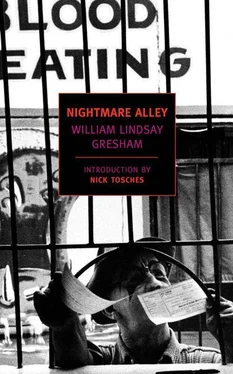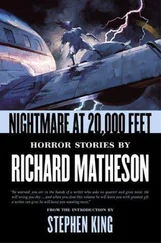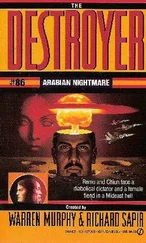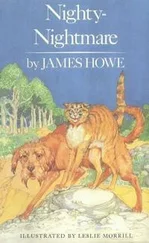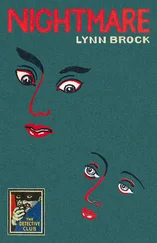The rush of water in the bathroom had given way to splashing and snatches of singing. Then the chung of the stopper and the water gurgling out.
Beyond the window, with its shades making the room cool and dark, a cicada’s note sounded, starting easy and getting loud and dying away, sign of hot weather coming.
Stan took one more breath of the pillow, pushing it around his face to shut out sound and everything except its yielding softness and its sweetness.
There was a sharp click from the latch of the bathroom door. The boy frantically smoothed out the pillow; he tore around the big brass bed and out into the hall and across to his own room.
Downstairs he heard Jennie’s slow step on the back porch and the creak of the kitchen chair as she slumped her weight into it to rest before she took off her hat and her good dress. It was the day for Jennie to do the wash.
Stan heard his mother come out of the bathroom; then he heard the bedroom door close. He crept out into the hall and paused beside it.
Inside there was a pat of bare feet on the floor and the catch of the bedroom door quietly slipped on. Grownups were always locking themselves in places. Stan got a sudden shiver of mystery and elation. It started in his lower back and rippled up between his shoulder blades.
Through the closed door came the soft clink of a perfume bottle being set down on the dressing table and then there was the scrape of chair legs. The chair creaked ever so little; it scraped the floor again; the bottle clinked as the stopper was put in.
When she came out she would be dressed up and ready to go downtown and she would have a lot of jobs for him to do while she was gone-like cleaning up the closet in his room or cutting the grass on the terrace.
He moved stealthily along the hall and eased open the door to the attic stairs, closed it behind him gently and went up. He knew the creaky steps and skipped them. The attic was hot and heavy with the smell of wood and old silk.
Stan stretched out on an iron bed covered with a silk patchwork quilt. It was made of strips of silk sewn in squares, different colors on each side and a single square of black silk in the center of each. Grandma Stanton made it the winter before she died.
The boy lay face down. The sounds of the house filtered up to him from far away. The whining scrape of Gyp, banished to the back porch. Jennie in the cellar and the chug of the new washing machine. The brisk clatter of Mother’s door opening and the tap of her high heels on the stairs. She called his name once sharply and then called something down to Jennie.
Jennie’s voice came out the cellar window, mournful and rich. “Yes, Mis’ Carlisle. If I see him I tell him.”
For a moment Stan was afraid Mother would go out the back door and that Gyp would Jump Up and make her cross and then she would start talking about getting rid of him. But she went out the front door instead. Stan heard the mail box rattle. Then she went down the steps.
He leaped up and ran over to the attic window where he could see the front lawn through the maple tops below him.
Mother was walking quickly away toward the car line.
She would be going downtown to Mr. Humphries for her singing lesson. And she would not be back for a long time. Once she paused before the glass signboard on the lawn of the church. It told what Dr. Parkman would preach about next Sunday, but it was so black, and with the glass in front of it, it was like looking into a mirror. Mother stopped, as if reading about next Sunday’s sermon; turning her head first one way and then another, she pulled her hat a little more forward and touched her hair.
She went on then, walking slower. The boy watched her until she was out of sight.
On every hilltop and rise Stan turned and gazed back across the fields. He could spy the roof of his own house rising among the bright green of the maples.
The sun beat down.
The air was sweet with the smell of summer grasses. Gyp bounded through the hummocks, chasing away almost out of sight and bouncing back again.
Stan climbed a fence, crossed a pasture, and then mounted a stone wall, boosting Gyp over. On the other side of the wall the fields were thicker with brush and little oak bushes and pines and beyond it the woods began.
When he stepped into their dark coolness he felt again that involuntary shudder, which was part pleasure and part apprehension, rise between his shoulder blades. The woods were a place to kill enemies in. You fought them with a battle-ax and you were naked and nobody dared say anything about it because you had the ax always hanging from your wrist by a piece of leather. Then there was an old castle deep in the forest. It had green moss in the cracks between the stones and there was a moat around it full of water and it stood there deep and still as death and from the castle there was never a sound or a sign of life.
Stan trod softly now and held his breath, listening to the green silence. The leaves were tender under his feet. He stepped over a fallen tree and then looked up through the branches to where the sun made them bright.
He began to dream. He and Lady Cynthia rode through the forest. Cynthia was Mother’s name, only Lady Cynthia was not like Mother except that she looked like her. She was just a beautiful lady on a white palfrey and the bridle was set with gems and jewels that winked in the dappled light through the branches. Stan was in armor and his hair was long and cut straight across and his face was tanned dark and with no freckles. His horse was a powerful charger as black as midnight. That was its name-Midnight. He and Lady Cynthia had come to the forest to seek an adventure, for in the forest was a powerful old magician.
Stan came out on a long-disused timber road where he slipped out of the dream, for he remembered that they had been here on the picnic. That was the time they had come out with Mr. and Mrs. Morris and Mark Humphries had driven Mother and Dad and Stan in his car with the top down. They brought the food in baskets.
Sudden anger rose up in him when he thought how his dad had had to spoil the day by having a fuss with Mother about something. He had spoken in low tones but then Mother had said, “Stan and I are going for a walk all by ourselves, aren’t we, Stan?” She was smiling at the others the way she did when something was wrong. Stan had felt that delicious shudder go up between his shoulders.
That was the time they found the Glade.
It was a deep cleft in a ridge and you would never know it was there unless you stumbled on it. He had been back since but on that day Mother had been there and all of a sudden, as if she had felt the magic of the place, she had knelt and kissed him. He remembered the perfume she had on. She had held him off at arm’s length and she was really smiling this time, as if at something deep inside herself, and she said, “Don’t tell anybody. This place is a secret just between us.”
He had been happy all the way back to the others.
That night when they were back home and he was in bed, the sound of his father’s voice, rasping and rumbling through the walls, had made him sick with rebellion. What did he have to always be fussing with Mother for? Then the thought of the Glade, and of how she looked when she kissed him, made him wriggle with delight.
But the next day it was all gone and she spoke sharp to him about everything and kept finding jobs for him to do.
Stan started down the loggers’ road. In a damp spot he stooped and then knelt like a tracker examining a spoor. The spot was fed by a trickle of spring. Across it were the tracks of auto tires, their clear and sacrilegious imprints just beginning to fill with water.
Stan hated them-the grownups were everywhere. He hated their voices most of all.
Читать дальше
